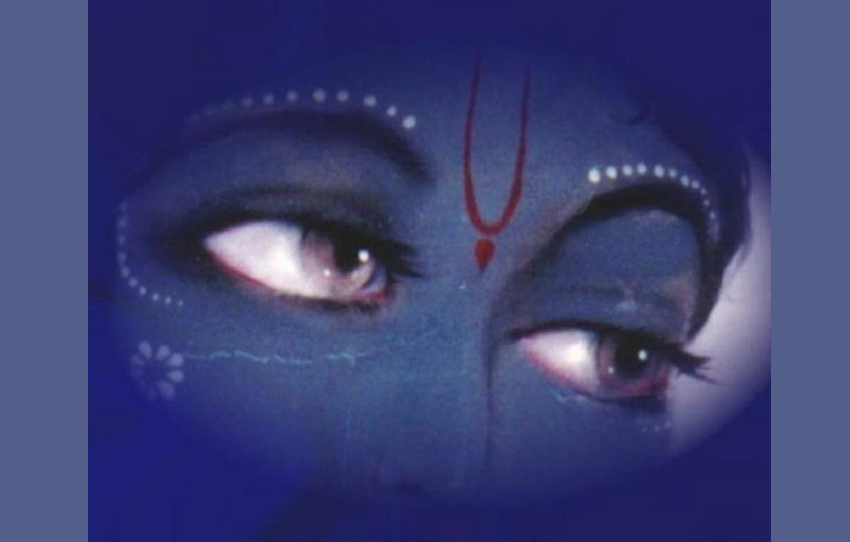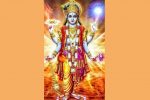NAME 40
Puṣkarāṣaḥ पुष्कराषः
His resembles the petals of lotus flower. Viṣṇu is known for the beauty of His eyes. When He looks graciously and compassionately at the universe through His beautiful eyes, the entire universe is endowed with auspiciousness. Viṣṇu is always compassionate and is full of auspiciousness. One’s compassion is expressed through the radiating auspiciousness of his body. One who has beautiful eyes like the Lotus flower.
४०. ॐ पुष्कराक्षाय नमः।
40. Puṣkarāṣaḥay Namah
Pushkaraakshah -One who has eyes (“akshah”) like the lotus (“pushkara”). Joy and Peace in the bosom of an individual are expressed in the world outside at no other point so vividly as in the eyes. The One, whose inner peace and joy, beaming out through His eyes, bring into the devoted hearts all the aesthetic beauty and romantic thrills of seeing a lotus dancing in the breeze, In short, the term indicates the Lord who with His beautiful looks, magically lifts all the sorrows in the devotee’s heart and fills it with Peace, Joy and Perfection.The Lord Who has Lotus Like Eyes.
INTERPRETATION GUIDED BY SANT VANI (WORDS OF SAINTS)
Puskaraksah – The lotus-eyed.
This name is given for the purpose of upāsana, meditation. The aksini, eyes, of the Lord are like the puskara, lotus. The lotus flowers are pleasant, similarly His eyes are pleasant to look at. His eyes are a source of blessing.
In the Indian religious culture, one looks forward to the Darshan of the lord, whichever be the devata of the temple. We have the experience of being deeply connected to another when we see the eyes of people we feel close to. Generally when we see a Vigraha, we look at the eyes, again to connect.
The sun is reflected both in the salty waves of the sea and in the clear surface of a mountain lake. Seeing things with the physical eyes is not enough.
You must experience the inner vision to know the significance of the things seen in those eyes which see things as they are – as unblemished life with no branding no labeling. Those are the ‘Lotus eyes’ of the Divine ; those are the lotus eyes of the lord- NayanamMadhuram, the Kamal Nayana Guru Swaroopa who see things as they are without judgements and labels.
A lotus blooms in mirth, yet is untouched by the mirth. Delicately the Lord’s tender Lotus eyes witness everything without attachment or conclusions, yet they overflow with love!
Soft, deep and loving in their gaze yet stern and discerning, such are the eyes of saints and sages with penetrating vision.
What is required in the seed of this eyes that view things with love is empathy.
https://os.me/empathy-the-greatest-quality/
Even if one is not able to go to the temple, wherever we are, we can meditate on the Lord. Meditation on form – that is roopdhyan, is defined as saguna brahma viśayamānasvyāpāra – mental activity centred on saguna brahma i.e.Īśvara. Any mental activity is not meditation. Although every action is born in the mind, it does not necessarily remain in the mind. The act of speaking, for example, is born of the mind. The words are all formed in the mind and are then expressed through the organ of speech. Although all forms of action emanate from the mind alone, they do not always stop there. They may manifest through the various means of expression. But in meditation, the activity is born of mind and remains in the mind; therefore, it is purely a mental action.
So thinking of the Lord for half a minute in the morning and half a minute in the night is meditation? No. Only those mental actions concerning the chosen object flow for a length of time can be considered as meditation. Relaxation is a preliminary step in meditation. But some of us are so stressed that relaxation itself is considered meditation. Secret of a good meditation is learning to toggle between exertion and relaxation.
Traditionally speaking, there is no meditation without Isvara in Sagun upasana. In order to pray effectively, I surface or invoke the meditator. Only a meditator meditates.
Here, in meditation, after relaxation and centring ourselves, we visualize the eyes of the Lord, a source of blessing. We bring to mind all the things, people and situations that we feel blessed with. And we can chant ‘anugruhitoham’, I am grateful. As we chant we see the meaning again and again and pray to be blessed with non judgmental vision and eyes that ooze love on whatever it beholds.



